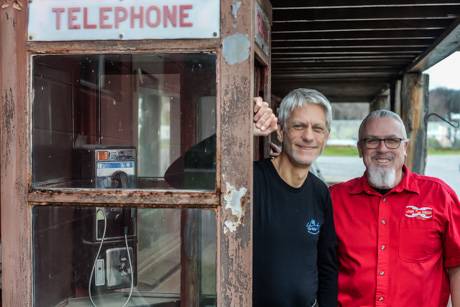
A three-year legal battle for the owners of The Ridge (aka Frost Ridge Campground) appears to have come to a close with a state appeals court upholding prior court decisions allowing the campground to host live music concerts, rent campsites and run a restaurant.
The ruling was handed down today by the Supreme Court of New York, Appellate Division, Fourth Judicial Department.
David and Greg Luetticke-Archbell haven't missed a concert season since 2010, even though the legal challenges to their concert series -- Jam at the Ridge -- started in 2014 when the Town of Le Roy, and David and Mary Cleere, and Scott and Besty Collins, first brought legal action to stop live music at the campground.
They were able to continue after winning motions in 2014 to allow an already-booked season to go forward, and as they continued to win court decisions -- including a Sept. 2016 decision by Judge Emilio Colaiacovo, presiding at the time over Genesee County Supreme Court, that ruled in favor of the owners.
The Town of Le Roy had dropped out of the lawsuits after losing a prior decision.
At the heart of the defense of Luetticke-Archbell's use of the property is that Frost Ridge -- going back to the ownership of David Frost, father of Mary Cleere and Betsy Collins --and its campground long hosted live music, rented campsites and served food, and that these uses fit within the meaning of a recreational area. The property was used in this fashion, they argued, before the Town of Le Roy changed the area's zoning to residential-agriculture in the 1990s.
In ruling in favor of Luetticke-Archbell, the appellate division concluded that contrary to the plaintiffs' contention, the Zoning Board of Appeals did not reach an arbitrary and capricious decision when the board ruled that the owners' use of Frost Ridge was a prior, non-conforming use. The plaintiffs contended that the ZBA failed to follow its own precedent and did not explain their reasoning.
"We reject that contention," the court ruled. "In 1998, the ZBA interpreted the Code to provide that a preexisting nonconforming use of land as a campsite runs with the land pursuant to section 165-13, notwithstanding section 165-39 (B), which requires that an existing campsite of record be brought into compliance with the Code upon being sold. Contrary to petitioners’ contention, the ZBA’s determination is consistent with that precedent."
The court ruled that there was substantial evidence for the prior, non-conforming use.
"That evidence included the affidavit of a former employee of Frost Ridge’s predecessor, who averred that the Property had been used for skiing and other recreational purposes since the 1950s," the court wrote. "He averred that he began working there in the 1960s and observed numerous recreational activities on the Property, including winter sports, live music, and campsite rentals."
It's common sense, the court concluded that the term "campsite" includes recreational activities, which might include live music, and this definition complies with the Town's own codes.
"The ordinance does, however, require that any large campsite “provide a common open area suitable for recreation and play purposes” (§ 165-39 [C] [8]), and thus expressly contemplates that a campsite is a place for recreation," the court ruled.
"Although the kind of recreation is open to interpretation, it is rational in our view to conclude that live music, along with swimming and other outdoor activities, is the kind of recreation to be enjoyed at a campsite."
The court also cited evidence of witnesses who said live, amplified bands played every summer at the campground in the 1970s and 1980s, and the plaintiffs failed to prove that use ever stopped for an extended period of time to constitute a break in the prior, non-conforming use.
"Here, it is undisputed that the Property functioned continuously as a recreational facility and campsite since the 1950s," the judges wrote. "To the extent that petitioners contend that use of the Property to host live music was abandoned in 2008 and 2009, we note that there is evidence in the record that live concerts were hosted on the Property during those years."
Photo: File photo of David and Greg Luetticke-Archbell

Bravo!!!
Bravo!!!
Hope this is the end of this.
Hope this is the end of this.